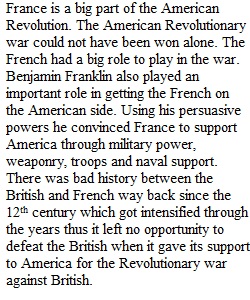


Q Americans tend to view the Revolution as a sort of mano-a-mano contest, a duel for freedom and independence between two combatants – on the one side, the plucky underdog, the nimble and unconventional American colonists; on the other, the powerful, professional but ponderous British. And of course, the good guys (i.e., the Americans) triumphed, largely through their own efforts, with perhaps just a bit of help from the democracy loving pre-revolutionary French. Is this view accurate? Or perhaps to be more precise, is there any portion of this view that is correct? Or is this just the sort of patriotic propaganda that often takes the place of history in the American educational system? After all, England did not exist in a vacuum, but rather as a participant in a complex system of European powers, many of which also had global empires. In fact, Britain had just recently fought and won a major war (the Seven Years, or French and Indian War) within such a system, where alliances and imperial colonies had played a crucial role. So the first portion of this topic is to consider how the American War of Independence fit within this larger European and imperial context. What was the perceived role of the colonies within the British system, and why did the colonies begin to find that role onerous? How did other European nations view the growing dissension between England and her North American colonies? How did they respond to it, before and after the outbreak of fighting? Could America have won its independence without European assistance? Why or why not? What did America need from France and other European nations such as Spain and Holland? Why was the American government, despite an acknowledged need for that assistance, hesitant to enter into agreements to get it? What fears did America have regarding treaties with European nations, and to what extent did those fears balance their needs? Which eventually won out, the fears or the needs? Were American fears about European assistance valid? When Americans think of the French assistance during the Revolution (which is rarely), there is often an assumption that the French were willing to help us because they were just “doing the right thing”, which was obviously to help the “good guys” escape British despotism. Left unanswered is exactly why French monarchists should be eager to help the colonies escape from the British monarchy, especially when those colonies had little with which to repay such assistance save gratitude. Or perhaps by helping the rebellious colonists, the French could “pay back” England for the humiliation of having lost the Seven Years War. But when one examines history more closely, it becomes virtually impossible to find instances of nations providing assistance to other nations, especially when that assistance comes at considerable cost, just because they are “nice guys”, or to “get even”. Nations almost invariably act in order to advance what they perceive to be their own best interests. Looked at in that manner, what did the French (and later the Spanish and Dutch) hope to gain by first providing assistance to the American colonies, and then later officially recognizing them as an independent nation and entering into treaties with them? That assistance, especially in the case of the French, proved to be hugely expensive (especially the massive loans of hard currency, of which the colonies had virtually none), so they must have expected more than just American goodwill in return. What goals did France have for its relationship with America? Did they realize those goals? Why did what had begun as a military conflict between England and her American colonies eventually expand into a global war? What role did that global conflict play in the eventual outcome of the Revolution? Could America have obtained its independence without the assistance of France? Why or why not? What do you feel was the most important French contribution to the American victory and eventual independence? Did France get what they wanted from the conflict? Why or why not? What were some of the long term implications of the alliance between France and the United States during the rest of the 18th century? Given the pivotal role played by France in helping America defend its revolution, why did America do nothing to help the French when their revolution came?
View Related Questions